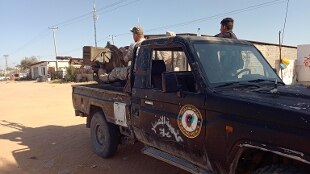- Libya: fragile truce, diplomacy at work. Serraj flies to Erdogan
- Libya, Haftar forces announce a truce. Conte meets al Sarraj
- Libya, Haftar rejects ceasefire request. Spokesman: "Tripoli militias must be wiped out"
- Libya, Haftar bombards Mitiga airport. Tripoli awaits the truce negotiated by Russia and Turkey
- Libya, fragile truce: al-Sarraj and Haftar go to Moscow
Share
January 13, 2020Stop sending Turkish troops to Libya, a ceasefire under the supervision of Russia and the United Nations, the withdrawal of mutual militias in the barracks and a political solution. These are some of the points of the agreement that Libyan Prime Minister Fayez al Sarraj and General Khalifa Haftar are learning to sign in Moscow, according to what was anticipated by Al Arabiya who cites his sources.The ceasefire agreement in Libya requires General Khalifa Haftar's Libyan army (LNA) to be responsible for protecting the country's oil wells and natural gas resources. It is one of the points of the agreement and reportedly the agreement also provides for an international supervision of Libyan ports.
The ceasefire in Libya, wanted by Russia and Turkey, entered into force at midnight yesterday, with the approval of the European Union, the United States, the United Nations and the Arab League.
In recent days Ankara has sent its soldiers to defend the government of al-Sarraj, and supports it politically. A few hours after the ceasefire began, al-Sarraj was already in Istanbul where he met Turkish President Erdogan. Russia instead supports Haftar's troops with weapons and mercenaries, together with Egypt, Saudi Arabia and the United Arab Emirates.
Libyan National Army forces loyal to General Haftar launched an offensive on the capital in April 2019 but were unable to conquer the city. Last week, however, they took the country's third largest city, Sirte.
An appeal to "turn the page over the past" was launched to the Libyans by the head of the government of national agreement al-Serraj. In a message broadcast on TV, Serraj asked to "reject discord and close ranks to move towards stability and peace".
The role of Italy
The ceasefire in Libya, albeit fragile, opens new spaces for diplomacy. So Prime Minister Giuseppe Conte intensifies talks and contacts: Call Vladimir Putin, hear Angela Merkel, talk to Fayez Sarraj, met at Palazzo Chigi. The aim is to ensure that at the Berlin conference, expected at the end of the month, Italy is not excluded from the table, but can save at least part of the role it has played in Libya until recently.
Conte arrived in Ankara to meet Erdogan
Italian Prime Minister Giuseppe Conte is in Ankara to meet Turkish President Recep Tayyip Erdogan. The Libyan situation is at the center of the talks. The meeting about four months after the meeting at the General Assembly in New York and a few weeks after the last telephone conversation. Tomorrow Conte will be in Egypt to meet the Egyptian President, al-Sisi.
Macron, respite both durable and verifiable
French President Emmanuel Macron wants the ceasefire in Libya to be "credible, lasting and verifiable". Macron said this in a telephone conversation with Russian President Vladimir Putin that Libyan Prime Minister Fayez al Sarraj and his rival, General Khalifa Haftar, will meet today in Moscow to sign the ceasefire. The Elysée reported in a statement.
Germany: conference in Berlin on 19 January
The Libyan conference in Berlin will certainly be held in January, German government spokesman Steffen Seibert said at the press conference. It should be held on January 19, according to what Germany has unofficially communicated to the participating countries, including Italy. Rome, through Foreign Minister Di Maio, had repeatedly urged the Germans, including at European level, to indicate a date for the summit as soon as possible. The Turkish presidency has made it known that Turkish President Erdogan is planning a trip to Berlin on that date, but has not provided any further details.
EU sources: mission not excluded, but it is too early
A European peacekeeping mission in Libya "is not to be excluded", but "for the moment" is not realistic ", because it is" too early ". The next step" must be new positive progress in the Berlin process ", for this reason European Council President Charles Michel and Chancellor Angela Merkel, with the UN, "are trying to convince leaders who have an influence in the region" to sit down at the table. So European sources of Michel's entourage, on the hypothesis advanced in recent days by Di Maio.
Even an "EU special envoy to Libya" for the moment is a topic that has not been discussed at the top of the EU, but "cannot be excluded". However, the focus at this stage is entirely on the Berlin process, with the meetings of the last few days between Merkel and Putin, and those of Michel with Erdogan and Al Sisi. "It is necessary to create momentum" to avoid new escalations and to give a "political context", to draw "a perspective". And also about this the President of the European Council will speak tonight in a meeting with United Nations Secretary Antonio Guterres.

